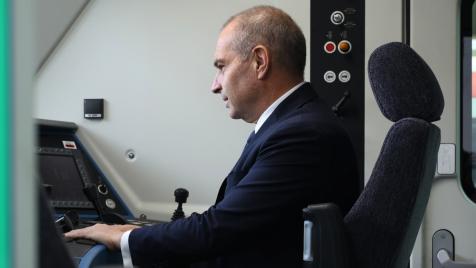Full Schengen membership could turn Bulgaria into a regional cargo hub
We need to invest in multimodal terminals and cargo airports, and also improve infrastructure

© ECONOMIC.BG / BTA
Following full admission to the Schengen area, Bulgaria has all the prerequisites to become a regional cargo hub. That is why the country must develop the North-South and East-West transport corridors. Experts who took part in the First Annual Forum on Transport, Logistics and Freight Forwarding, organized by Manager magazine, united around this view.
They did not fail to point out the unsatisfactory quality of the road and railway infrastructure, the lack of multimodal terminals and the insufficient symbiosis between road, rail, sea and air transport, which are stumbling blocks for Bulgaria.
Bulgaria and Romania are expected to fully enter the Schengen borderless area in January, if all other member states officially agree to this on December 12. A meeting of the interior ministers of the European Union will be held in Brussels on that date.
North Macedonia and Turkey are not very happy about our admission to Schengen," said Simeon Ananiev, Chairman of the Green Transport Cluster Board of Directors.
According to him, this is because the route of cargo transportation will change – the corridors running from Alexandroupolis and from Thessaloniki to Vidin will be strengthened. However, Ananiev is of the opinion that “we should not have a corridor mindset, instead we should build a network.”
“Cargo is like water – it follows the path of least resistance. I am optimistic that Bulgaria will become a regional hub.”
He commented that at the initiative of the Argentine ambassador, a meeting was held with air carriers, at which the possibilities for Bulgaria to become a redistribution hub for the Americas were discussed. This means that shipments would arrive only by plane, before being distributed via road and rail infrastructure.
If we become a hub, we will be able to gather cargo from all neighboring countries and serve as a distributor. Schengen will help create such centers for concentration and redistribution of flows."
Ananiev said that large investors are interested in building such hubs, but they also want these to be located close to a railway connection and highways, and if there is an airport – that’s a bonus. According to him, Gorna Oryahovitsa can be such a hub for integrating all types of transport.
The construction of an intermodal terminal in Gorna Oryahovitsa was a project included in one of the initial versions of the country’s Recovery Plan. It was subsequently revised, and Ruse was chosen as the location for its construction. However, Bulgaria was unable to implement the project, as it turned out that the construction would be too expensive. The Bulgarian Ministry of Transport is looking for other European sources of funding, but so far without any success.
The automotive industry
For the automotive industry, Bulgaria's entry into the Schengen area will be "like a breath of fresh air," commented Nikolay Rashkov, representative of the Union of International Carriers in Brussels and member of the European Commission's transport expert group. He spoke about a study made at the beginning of the year, which showed that at the three border points - near Vidin, Ruse and Kulata - there are about 50-60 thousand crossings per month. After the start of the war in Ukraine, there has been a double increase in cars from third countries, which created additional congestion at the borders.
The average delay at Vidin was 18 hours per car, which is very unprofessional for a border between two European countries," he pointed out.
He added that the huge lines of trucks are due to increased checks for those entering from third countries, as well as the lack of good coordination between Bulgarian and foreign inspection bodies. Rashkov added that the losses to the Bulgarian economy from this whole situation in just one year are about half a billion euros.
After becoming full members, these losses will begin to decrease, and transit will accelerate. It is important to hear the exact date for our entry and what the verification procedure will be."
Asked how the automotive industry will maintain its competitive advantage after Bulgaria's accession to Schengen, Pimk Holding CEO Vasil Lyaskov commented that competition can refine the market and that the lack of it "leads to arbitrariness and the quality of service for people declines." He emphasized the need to develop infrastructure so that the country can truly feel the positive effect of accession to the Schengen area.
This summer we had a situation when trucks were stuck in Vidin for 36 hours.”
Intermodality and multimodality
The presence of good infrastructure would allow for greater deployment of intermodality and multimodality, Lyaskov also pointed out. He noted that although these concepts are well-established in Western Europe, the lack of adequate infrastructure in Bulgaria hinders their implementation. He explained that instead of using Bulgarian ports and terminals, large flows of cargo are redirected to ports in Romania and Turkey.
Companies prefer the stability and efficiency of existing infrastructure in these countries," he added.
According to Lyaskov, Bulgaria is not perceived as a strategic hub. He pointed to the example of Hungary, which offers modern logistics terminals, well-organized customs procedures, and short cargo processing times.
The average customs processing time in Hungary is 24 hours, while in Bulgaria this process is significantly slower," said Lyaskov.
The railway infrastructure also remains a serious problem. Lyaskov stressed that the current state of railway connections and train stations in Bulgaria does not meet modern standards. In his words, passing through Bulgaria is like traveling by cart - from the Turkish border to the Serbian one it takes up to 48 hours, and the wait at the borders itself is between 24 and 48 hours. In Western Europe, a similar distance is covered in 12-16 hours.
According to Deputy Transport Minister Zhivko Petrov, multimodality is a way of organizing transportation and in order to have this, 3 factors are needed - a regulatory framework, good infrastructure, and logistics companies and operators. In terms of regulation, Bulgaria has done everything it needs to, but "we have a problem in implementing the regulatory framework."
Although it is well written on paper, in reality, it does not work. More work needs to be done, and the national administration needs to gain the conviction that it plays on the same side as the business sector. Whatever you want to receive as a service, you have to give first.”
Petrov added that there is also something to be done in terms of infrastructure. The Deputy Minister admitted that in railway transport “we do not have even one complete line”. In his words, the main routes are being cut into pieces.
We need to have one route ready before we start another. By working all over the place, we have completed nothing."
According to him, geopolitical events have brought into focus the so-called "middle corridor", a transport connection between Europe and Asia via the Black Sea. The Deputy Minister pointed out that Bulgarian ports have the potential to develop and take on more cargo and stated that "we are lagging behind Constanta, which is almost 100% full." He explained that while the port of Burgas is making progress and has been developing well in recent years, the one in Varna is lagging behind, even if it has sufficient capacity and space.
Modernization is necessary, but the basic infrastructure is there. This is the moment when we need to hurry up so as not to be bypassed," the deputy minister emphasized.
Air transport
There is no way Bulgaria can be a regional hub without aviation, said Todor Ivandzhikov, founder and manager of the Bulgarian Aviation Industry Association (BAIA). According to him, there should be more cargo airports, and he called for small regional airports not to be converted into solar parks.
The cargo is always going to Belgium, Germany and France.”
According to him, companies like Amazon and DHL have already overburdened Leipzig Airport and are starting to look for new bases. Ivandzhikov is of the opinion that small airports should be given a concession so that they can become cargo hubs.
He cited numerous examples from the world and emphasized the need for modern infrastructure in order for Bulgaria to take its place on the global logistics map. Ivandzhikov pointed out that e-commerce has significantly increased the demand for cargo aviation services.
Bulgaria already has an airline with a Boeing 747 that operates cargo flights from China to our country, and from here the cargo continues to Europe, the USA and Canada," he said.
He warned that cargo flow from China is decreasing due to geopolitical and economic changes, but at the same time, the cargo flow from Vietnam and other Asian countries was increasing. “Last month I visited China and Vietnam and saw great interest in Bulgaria as a possible logistics hub,” he added.
Ivandzhikov mentioned that in talks with representatives of logistics associations in Asia, the construction of a brand-new airport with a cargo terminal in the region is being discussed. According to him, Bulgaria and Romania are the main options.
The faster we act, the better chance we have of attracting these investments,” he stressed.
One of the most serious problems that Ivandzhikov identified is the lack of appropriate infrastructure for handling large cargo aircraft.
A Boeing 747 can land at Sofia Airport, but there is no equipment for its effective unloading. At airports like Gorna Oryahovitsa, the situation is even more difficult - they are simply not prepared for such operations," he said.
According to him, this leads to a redirection of cargo flows to Romania and other neighboring countries. There is a need for a zone where cargo can move directly from a plane to a train or truck, and be stored and processed quickly. This will not only attract investments but will also bring huge revenues for the state from customs duties, he explained.
Ivandzhikov reminded that Bulgaria has already missed the opportunity to establish itself as a passenger aviation hub. Back in the day the now-defunct national carrier Balkan had 52 aircraft. For comparison, Turkish Airlines had 27, but gradually, Bulgaria lost its position and traffic went to Turkey. In his words, Bulgaria risks repeating the same mistake with cargo transport.
According to Ivandzhikov, the future lies in innovations such as cargo drones and unmanned aircraft. He commented that major manufacturers such as Boeing and Airbus are already developing projects for unmanned cargo aircraft that will connect Europe and the United States.
In our country, companies like Dronamics are also advancing with similar technologies, but regulations are significantly slowing down the process," he noted.
According to him, drones will first be used in limited areas - over deserts, seas or highways - to ensure safety. Bulgaria should invest in infrastructure for vertiports - places for drone landings and take-offs.
Translated by Tzvetozar Vincent Iolov

 Gloria Hristova
Gloria Hristova 

